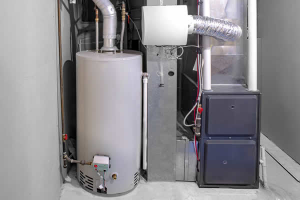
14 Jan, 2021
A leaking water heater can be a big problem in the home. Even a slight leak can snowball, and you can find yourself with damaged floors and walls, hefty repair bills, a complete water heater failure, or a lot of other unpredictable crises. So, it’s important to assess the situation as soon as it starts.
Your hot water heater leaking may not necessarily mean you need to replace it; it could be a minor problem with an easy fix. However, you’ll need to diagnose the problem before you take any action.
We’ve outlined the steps you should take to help you diagnose and repair your hot water heater leak.
The first thing you should do is determine the source of the leak. A puddle of water at the bottom of your water heater does not necessarily mean it is from your water tank leaking. You could have water leaking from hot water heater furnace drain lines or water softener discharge lines. Or, you could have other plumbing issues, such as water pressure that is too high. Water heater leaking from top pipes is usually a sign that your inbound water pressure is high.
Sometimes you may see condensation forming on the pipes and dripping onto the floor, rather than an actual leak. This water build-up happens mostly during humid seasons or in basements.
If you experience a water heater leak, first dry the area and inspect the water heater and plumbing for any water leakage signs. If you don’t find anything, place some paper towels down to check every few hours to see if the water continues to build up. If the water does not stop and you can’t find any obvious leaks, chances are it is your water heater dripping from an unseen source.
It can be difficult to determine the source of the leak, as water from the sides can trickle down and collect at the bottom. However, once you find the problem spot, you’ll need to know your next steps.
Some cases, such as the water heater leaking from bottom pipes, don’t warrant a full replacement of your water tank. But, if you determine that the leak is originating from the tank itself, you will need to replace it.
Your water heater tank could be leaking for many reasons. First, water tanks can crack. Or, you may have salt and other chemicals in your water, which can corrode the insides of the tank, causing pinhole leaks.
If you can’t quite pinpoint your source, it’s best to have a licensed professional inspect your unit.
If you don’t have a significant issue on your hands, you can probably get out your handyman kit and DIY. However, remember that some repairs are complicated — and even dangerous — and are best left to a professional. One example is when you are dealing with a gas water heater leak. Below, we’ve covered a few leaks that you can fix by yourself.
1. Inlet and Outlet Leaks
If the leak originates from the area where the water inlet or outlet connects to the heater, tighten the connection with a pipe wrench. If the pipes are leaking, you can replace them with ones of a similar model. Check your heater’s manual for the type of pipe you should buy.
2. Temperature & Pressure Relief Valve Leaks
Temperature and pressure relief (T&P) valve leaks are usually caused by overheating or excessive pressure in the tank. First, reduce the thermostat setting. Then, turn your heater back on to observe the valve. Is it still leaking? If yes, you may need to open up the valve to drain it of any debris. If these methods don’t work, you may have a faulty T&P valve that you’ll need to replace. Make sure your new valve matches with your water heater.
3. Drain Valve Leaks
A leaking drain valve is usually a sign of debris build-up. Place a bucket under the valve and open it up. The debris will be flushed as the water flows out.
If this does not work, you likely need to replace the drain valve. Like with a T&P valve, make sure to get one suited for your heater model.
If the fixes above don’t work, you may need to get professional help. If your water tank needs to be replaced or you run into some trouble while trying to DIY, shut off your water heater and contact a professional as soon as possible. Water heater leakage may seem minor, but it could be a symptom of a bigger problem. Sometimes, you could be causing more harm than good by attempting to fix it on your own.
There are many causes of water heater leaks. Sometimes your unit may just be old and facing the deterioration that comes with age. Chemicals and sediments may have corroded the inside of the tank, the pipes may have thinned, or your heater's valves could be too loose.
In other cases, natural disasters, such as earthquakes, could cause damage by shifting your heater around.
To keep your furnace in good condition, you should get it serviced at least once or twice a year — ideally before and after winter. Regular maintenance helps to keep it up and running for longer. When problems are addressed as they arise, your water heater can run at maximum efficiency, preventing breakdowns such as leaks.
Your water heater is one of the most important appliances in your home. Whether you need emergency repair or maintenance, Valley Service are the guys to call. We understand the need to be proactive about system maintenance and have been offering professional furnace repair in Fargo and West Fargo, North Dakota, for over 40 years. Call us today at 701-293-5701 to book a technician.